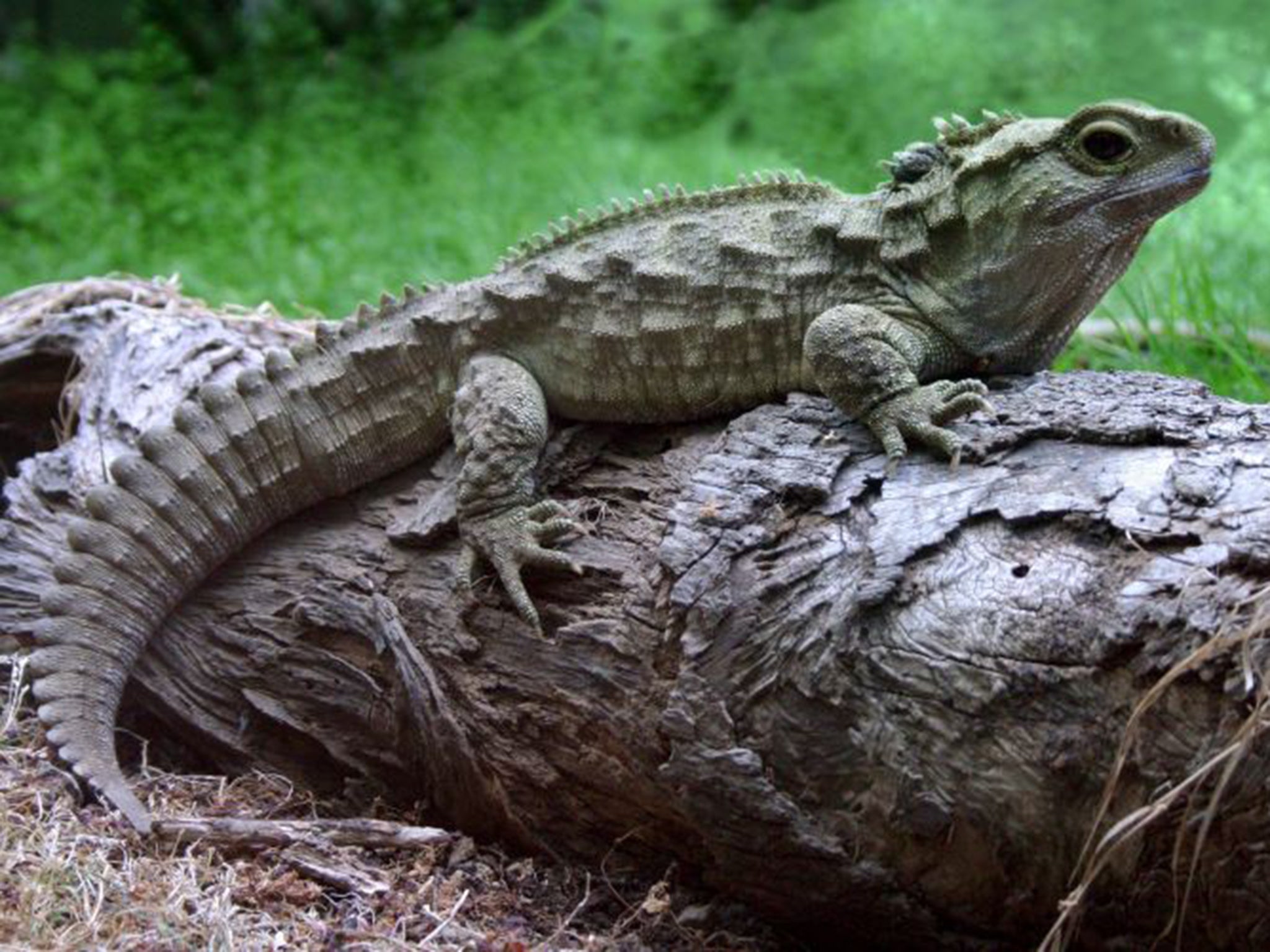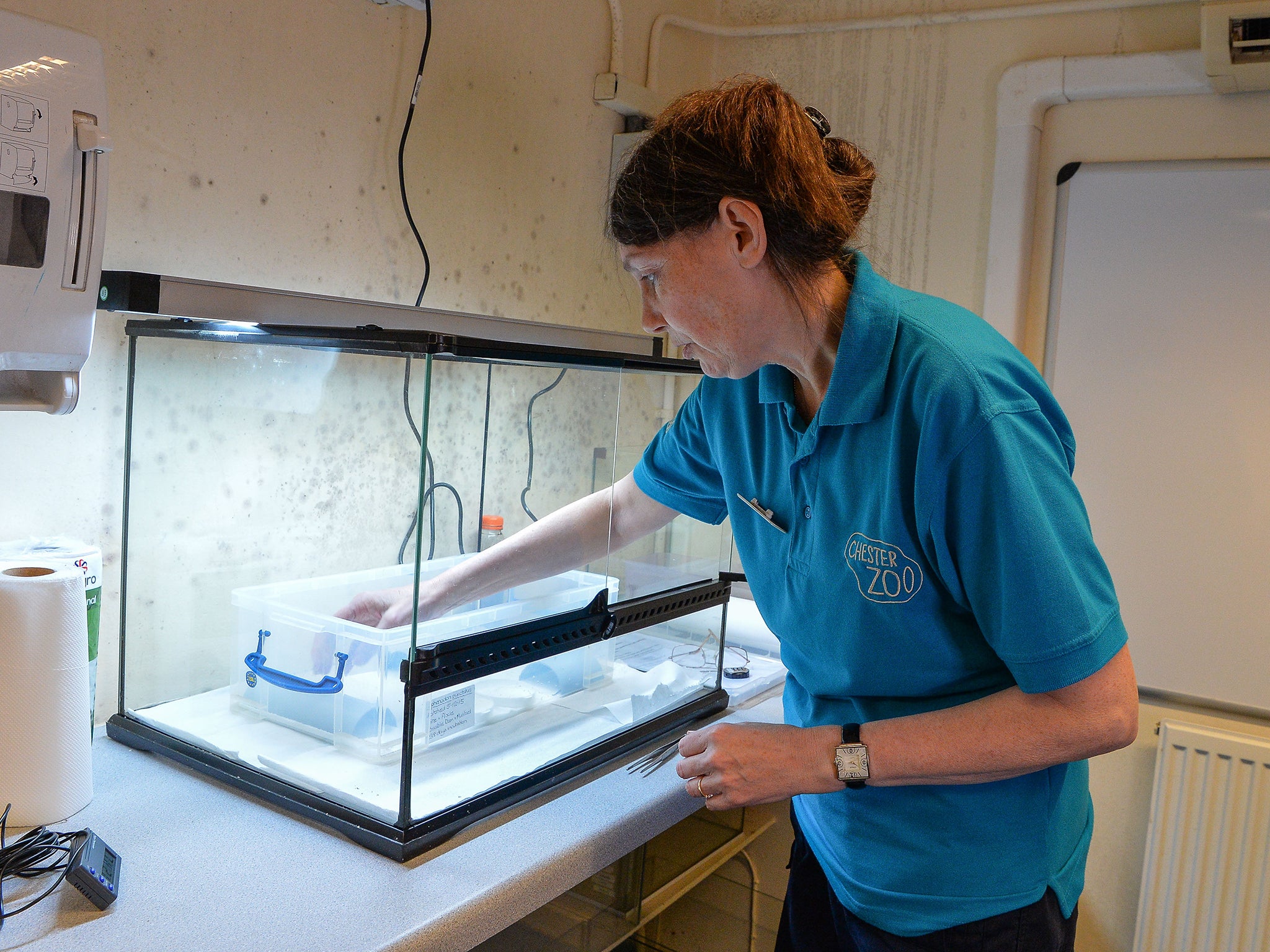Tuatura: Lizard-like reptile takes 38 years to lay an egg in Chester Zoo
But if your kind has been around 220 million years, there’s no hurry

A lizard-like reptile which survived the demise of the dinosaurs and now lives only in New Zealand has given birth for the first time in captivity outside its homeland – in an incubator at Chester Zoo.
If you thought it was difficult for pandas to breed in captivity, spare a thought for tuataras. They take 20 years to reach sexual maturity, come into breeding condition once every four years, and seem to live in perpetual slow motion – which is not such a problem if your life expectancy is 120 years.
However, after four decades of trying, Chester’s specialist keeper Isolde McGeorge can now claim to be Britain’s first midwife for the tuatara, an ancient reptile that flourished on almost every continent 220 million years ago, until that is it became extinct everywhere except New Zealand.
At the end of last year, the first tuatara hatchling emerged from its egg after an incubation period of 238 days, lovingly – if nervously – supervised by Ms McGeorge, 58, who has been trying to breed this enigmatic species at Chester ever since she began looking after them in 1977.
“I’ve had a long and fruitful career at the zoo, including the birth of Komodo dragons, but nothing is going to top this. It has always been one of my goals to breed tuataras, and now we’ve got there after watching this egg for every spare moment,” Ms McGeorge said.
“Tuataras are notoriously difficult to breed, and it’s probably fair to say that I know that better than most as it has taken me 38 years to get here,” she said.

“It’s taken lots of hard work, lots of stressful moments and lots of tweaking of the conditions in which we keep the animals along the way – but it has all been very much worth it,” she added.
Although tuataras look like lizards they actually belong to a separate reptilian order called the Rhynchocephalia which were once dominant on land until all but one species, tuataras, died out. A curious feature of their anatomy is a “third eye” in the centre of their forehead which is no longer used for vision but may have some role in detecting ultraviolet light.
“Tuatara lived before the dinosaurs, they lived with the dinosaurs and they survived after the dinosaurs had died out. They really are a living fossil and an evolutionary wonder,” Ms McGeorge said.
She has only twice witnessed the extraordinary courtship dance of male tuataras, when they circle the females with the head crests erect while performing a stiff-leg walk called a “stolzer gang”, after the straight-leg marching of German soldiers. This particular pairing at Chester, between a male called Pixie and a female called Mustard, took about 12 years to arrange before it ended with the mother producing two eggs.
“When you’ve worked with tuatara for as long as I have you come to realise that they don’t do anything in a hurry. Their metabolism is incredibly slow. They take just five breaths and just six to eight heart beats per minute, and they only reproduce every four years with their eggs taking a year to hatch,” Ms McGeorge said.
Once inseminated, the female secretively laid her eggs in sand far from her home burrow. As it was all done at night – tuataras are nocturnal – this made life even more difficult for Ms McGeorge, who nevertheless managed to put both eggs in an incubator where the ambient temperature was carefully controlled to stay between 18C and 22C.
“The night before it hatched, I spotted two beads of sweat on one of the eggs. I had a feeling something incredible was about to happen and so I raced in early the next day and there she was,” she said.
“Immediately, I broke down in tears. I was completely overwhelmed by what we had achieved. Now that we have all of the key factors in place, the challenge is to repeat our success and to do it again and again.”
The baby tuatara was born in early December but Chester Zoo has only now decided to make the birth public. The zoo is about to be the focus of a Channel 4 documentary series, The Secret Life of the Zoo, where Ms McGeorge and her colleagues are filmed as they go about their conservation work in captive breeding.
As for the baby tuatara, the Chester Zoo team has named it “baby Isolde” after Ms McGeorge – although there is still an outside chance that the new arrival could turn out to be male.
Tuatara facts
* Scientific name: Sphenodon punctatus.
* Tuatara are the last surviving members of the order Rhynchocephalia, or beak-heads. These ancient reptiles once flourished as long ago as 225 million years, before dinosaurs.
* About 70 million years ago, the species became extinct everywhere except New Zealand.
* One of the most curious body parts of the tuatara is a “third eye” on the top of its head. The “eye” has a retina, cornea, a lens and nerve endings, yet it is not used for seeing.
* Tuatara do not reach sexual maturity until they are around 20 years old.
* Tuatara are the only reptile that do not have a penis, instead they mate like birds.
* In courtship, males circle the females before their crest becomes erect, leading to the performance of a “stolzer gang” – a stiff-legged walk.
* Scientists estimate that they can live for up to 120 years.
* Chester Zoo has seven tuatara – one male, five females and the as yet unsexed newcomer.
* The egg from which the youngster hatched was laid on 11 April. It hatched on 5 December.
* Chester Zoo first began caring for tuatara in 1962.
The Secret Life of the Zoo begins on 2 February on Channel 4
Join our commenting forum
Join thought-provoking conversations, follow other Independent readers and see their replies
Comments
Bookmark popover
Removed from bookmarks